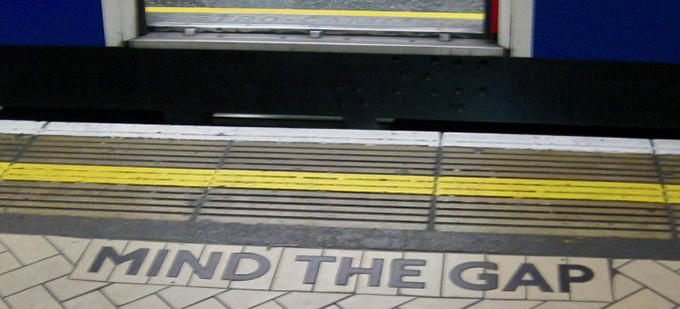
Gap talk. You know, the “this research fills a gap in the literature” line. Most of us have made this statement at some point in our academic life. It’s the most common starter for journal papers, proposals and theses, according to genre researchers. They’ve identified three moves in the game of what they call CARS, Create a Research Space. CARS basically goes –
- Establish the context for the study
- Describe what is missing – the gap
- Identify how you will fill the gap
Yep, the gap is named, potentially filled and Bob’s your uncle – your paper is accepted, the research is funded, the supervisor allocated. But not so fast. CARS has been critiqued on a number of counts, including:
- “Gap” overstates the reality of most disciplines. The majority of us work in occupied spaces where there is already a lot of research activity going on. When there actually is a big space – something worthy of the title “gap” – it is unlikely that one researcher and/or one research project will fill it. For this reason, some genre researchers (including John Swales who is credited with the original CARS formulation) are uncomfortable with the notion of a gap, arguing that what people usually find is a tiny niche not a yawning crevasse. So stating that you will fill “the gap” is generally researcher hubris rather than reality.
- CARS is an additive model of knowledge. Knowledge is stable and more is continually added. Gap critics say this isn’t the situation in all instances. Critics say that the idea of a “gap” might work for some disciplines and types of research where adding is the way that knowledge is built. However, it isn’t right for all disciplines and research traditions – see this critique offered by qualitative researchers.
- CARS is a timid notion. It doesn’t offer the possibility of identifying problems in existing knowledge traditions, nor of reframing questions which open up new directions. It’s anti innovation and change. Gap talk is fundamentally about preserving the status quo.
- There might be a good reason why no-one has filled the gap – it’s not interesting, it’s not significant. Not being done is not enough of a reason to do a piece of research. At the very least CARS move 2 – Describe what is missing – needs to be accompanied by a justification for why it is important to attend to the lack of existing research.
These objections are all important. if you are going to make the warrant for your research a “gap” in the existing literatures, then it is certainly worth seriously considering these concerns. However, it’s the last objection I’m really concerned with. I want to ask the question – is filling the gap really the purpose of our /your/my research? is that all there is? I/we fill the gap and that’s enough?
I worry that the CARS three moves are too reduced, very over-simplified. That we’ve done the research equivalent of making a face out of a semicolon, a dash and a bracket. : – )
Using ”the gap”formulation as research warrant eliminates other possible formulations, variations on a theme which might be important. There surely are other ways to provide a rationale for your research. The “gap” is not all that there is.
To illustrate my point about variation, here’s a few examples. These examples are expressed colloquially – of course, they’d need to be tidied up a bit for “proper” academic writing. I’ve written these examples in pretty plain language to make my issue with over-simplification apparent.
- The scholarly community in ( name discipline or sub discipline ) seems to agree on (this, these things).
A next step is to…
It is worth going back to…. to see if the early work still holds (describe change) …
We are not yet sure of whether (this) applies to/works with (topic)
It’s about time we reconsidered (this plus reason). My research therefore…
It’s urgent that we pick up the strand/pace of work which focuses on.. because….
- The field of (name) research is based on a number of implicit agreements/assumptions.
This research takes (one of these… say what) and puts it to the test through critical reading/empirical testing/ historical research/philosophical analysis. I …
- There is a truckload of research about (topic) in ( discipline or sub discipline).
Most of this research works with methods/literatures from…. This research brings a different body of work/different approaches to (topic), asking what this might add/show about…
Reviewing this work ( say how) suggests that the field might benefit from (what, say why)
This corpus was developed by people in particular contexts and of specific persuasions – the discipline is no longer like this/ it has different and new concerns/obligations/commitments. Therefore…
It is worth asking the question why nothing has apparently resulted from all of this work.
And why not simply:
- It’s always puzzled me why…
- The profession is in desperate need of… Government policy focuses on ( topic) but this fails to deal with (topic, information, context, situation, events)
I am sure that you get the idea here. And I am sure that you can add other formulations.
Of course most of these variations on research warrants could potentially be reduced to “gap” talk, if you were so inclined. But as I’ve written them, they do additional work. These alt. warrant wordings can be made quite specific to particular contexts, disciplines, research traditions and topics. And because these variations on research justifications offer particularity, they orient the researcher to their research purpose in a different way. They thus also offer something much clearer in relation to the So What and Now What at the end of the project. The purpose of the research is not simply to “fill a gap” but to do and be something much more targeted.
